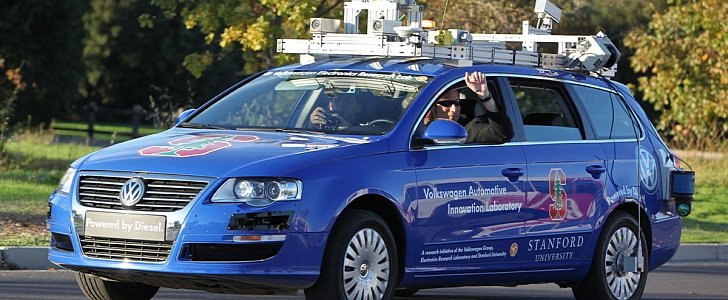If you take a step back for a short while and look at the current direction the automotive industry is headed in, you might find a rather odd picture unfolding in front of you.
Everybody seems hell-bent on making the best autonomous car, with Silicon Valley jumping into the fray as well. Nobody's talking about V8 engines anymore, not even about downsizing and supercharging. It's only about sensors, LIDAR, cameras and the artificial intelligence to make sense of it all. And why is that? Well, certainly not because the public demands it, as this study from the University of Michigan shows.
The survey was carried over a period of two years, which should reveal some interesting trends about how people's acceptance of autonomous cars evolved during this time. And so it does, only the trend isn't what you might expect. Instead of becoming more and more at ease with the idea of leaving an AI to handle the car's controls, drivers have continued to show the same levels of reluctance throughout the whole duration of the study.
The research is divided into two segments, one for the semi-autonomous vehicles and the other for fully autonomous cars. The former are met with a little less circumspection than the latter, but the differences aren't as great as one would imagine. For example, over four in five people would prefer not to ride in fully autonomous vehicles, while 46 percent of drivers would prefer to use a car with no self-driving capabilities over with partial or full self-driving technology if given the choice.
The ones the most open to the idea are the young drivers, but even for them, the percentages are still low. Just 19 percent of those aged between 18 and 29 said they would prefer fully autonomous cars, with the percentage dropping to 9.6 for drivers aged over 60. The only age interval where people who would favor fully autonomous cars over non-autonomous ones is that of drivers ages 30 to 44: 43 percent compared to 35 percent.
“One major theme we have seen across these surveys is the strong desire to retain some ability to control the self-driving vehicle -- nearly everyone still wants traditional driver controls available,” one of the researchers told Automotive News. “It seems that giving up control is one of the major issues when it comes to acceptance of these vehicles.”
He was referring to the worryingly low percentages of those who say they would trust a fully autonomous vehicle: only 9.7 percent said they had no concerns about it, with 37 percent opting for "very concerned," 29 percent for "moderately concerned," and 24 percent "slightly concerned." That just goes to show that while the companies need to work on the technology, they also need to work with their client's minds. And this issue might prove even more difficult - or at least more time consuming - than the first.
The survey was carried over a period of two years, which should reveal some interesting trends about how people's acceptance of autonomous cars evolved during this time. And so it does, only the trend isn't what you might expect. Instead of becoming more and more at ease with the idea of leaving an AI to handle the car's controls, drivers have continued to show the same levels of reluctance throughout the whole duration of the study.
The research is divided into two segments, one for the semi-autonomous vehicles and the other for fully autonomous cars. The former are met with a little less circumspection than the latter, but the differences aren't as great as one would imagine. For example, over four in five people would prefer not to ride in fully autonomous vehicles, while 46 percent of drivers would prefer to use a car with no self-driving capabilities over with partial or full self-driving technology if given the choice.
The ones the most open to the idea are the young drivers, but even for them, the percentages are still low. Just 19 percent of those aged between 18 and 29 said they would prefer fully autonomous cars, with the percentage dropping to 9.6 for drivers aged over 60. The only age interval where people who would favor fully autonomous cars over non-autonomous ones is that of drivers ages 30 to 44: 43 percent compared to 35 percent.
“One major theme we have seen across these surveys is the strong desire to retain some ability to control the self-driving vehicle -- nearly everyone still wants traditional driver controls available,” one of the researchers told Automotive News. “It seems that giving up control is one of the major issues when it comes to acceptance of these vehicles.”
He was referring to the worryingly low percentages of those who say they would trust a fully autonomous vehicle: only 9.7 percent said they had no concerns about it, with 37 percent opting for "very concerned," 29 percent for "moderately concerned," and 24 percent "slightly concerned." That just goes to show that while the companies need to work on the technology, they also need to work with their client's minds. And this issue might prove even more difficult - or at least more time consuming - than the first.

